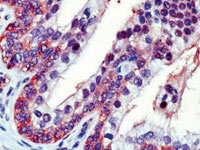
据外媒报道,每个细胞都包含有自我毁灭的机制,当细胞受伤或者生病时,会启动该机制诱导细胞死亡。但是,研究人员最近发现,在正常的细胞中,诱导细胞自杀的死亡受体CD95实际上会促进癌细胞的生长。
美国芝加哥大学和西北大学芬堡医学院的研究人员在近日出版的《自然》杂志上指出,阻止这个死亡受体的活动能够阻止甚至逆转人体、老鼠的肿瘤细胞的生长,这或许为癌症治疗提供了一种全新的思路。
细胞凋亡是一个主动的、信号依赖的过程,可被许多因素诱导,如放射线照射、毒素等。这些因素大多可通过激活死亡受体而触发细胞凋亡机制。在正常情况下,当死亡受体CD95被特定的蛋白激活时,就会触发细胞凋亡机制。
科学家一直认为,失***亡受体可能是肿瘤形成的一个先决条件。然而,在许多癌细胞中,其CD95的浓度一直很高,在癌细胞快速生长和繁殖时也是如此。
领导这项研究的芬堡医学院血液学和肿瘤学教授皮特马库斯说,这或许表明,CD95实际上会促进肿瘤的生长。在试管内,对凋亡最敏感的细胞都是癌细胞,那么,这些细胞为何对凋亡如此敏感而又没有凋亡呢?
马库斯研究团队研究了CD95在几个人类的癌症细胞中所起的作用,芝加哥大学医学研究中心的妇科肿瘤专家恩斯特林格耶尔研究了CD95在患有肝癌以及卵巢癌的老鼠的癌细胞生长中所扮演的“角色”。
研究发现,有选择性地删除或者减少这些肿瘤中的CD95能够大大降低细胞的生长速度,在某些情况下,甚至可以杀死这些肿瘤细胞。当研究人员减少癌细胞系中触发CD95活性的物质时,肿瘤甚至停止了生长。
林格耶尔表示,这大大颠覆了人们之前的想法。20年来,科学家一直尝试使用CD95来杀死肿瘤,但是,现在证明,CD95实际上促进了肿瘤的生长。
研究人员接下来将研究细胞怎样以及何时打开和关闭CD95。而JNK作为CD95的一个下游目标,对于细胞打开CD95可能非常重要,因为它在不同的浓度下分别表现出了容易死亡和容易生长的功能。
能够阻止CD95配体(激活CD95的一个分子)活动的药物目前正进入第二阶段的临床测试,该药物最初是为了阻止受到变性疾病和艾滋病影响的细胞的死亡,现在研究人员发现该药物也能够有效地杀死肿瘤细胞。
科学家希望结合化疗来测试CD95配体的一种抑制剂。化疗能够诱发压力反应,随着CD95配体浓度的增加,可能会进一步促进肿瘤的生长。皮特解释说,每个癌症细胞都会让其死亡受体保持在合适的浓度。
林格耶尔表示,这种方法距离临床应用还有几年的时间,但现在可使用两种方式来治疗病人:使用一个可溶解的受体,在配体依附细胞并且促进肿瘤细胞生长之前将其清除;或使用抗体来阻止其活动。
美国圣祖德儿童研究医院的免疫学教授道格拉斯·格林说,该研究也将让科学家更好地理解CD95在健康和疾病方面的作用。
美国圣祖德儿童研究医院的免疫学教授道格拉斯格林说,该研究也将让科学家更好地理解CD95在健康和疾病方面的作用。(生物谷Bioon.com)
BJC:一种肿瘤退化实时监控新方法
PNAS:高效低毒纳米颗粒抑制耐药肿瘤细胞生长新成果
Cancer Research:microRNA-155促进肿瘤发生 或为联系炎症和癌症桥梁
生物谷推荐原文出处:
Nature doi:10.1038/nature09075
CD95 promotes tumour growth
Lina Chen,Sun-Mi Park,Alexei V. Tumanov,Annika Hau,Kenjiro Sawada,Christine Feig,Jerrold R. Turner,Yang-Xin Fu,Iris L. Romero,Ernst Lengyel& Marcus E. Peter
CD95 (also called Fas and APO-1) is a prototypical death receptor that regulates tissue homeostasis mainly in the immune system through the induction of apoptosis1, 2, 3. During cancer progression CD95 is frequently downregulated or cells are rendered apoptosis resistant4, 5, raising the possibility that loss of CD95 is part of a mechanism for tumour evasion. However, complete loss of CD95 is rarely seen in human cancers4 and many cancer cells express large quantities of CD95 and are highly sensitive to CD95-mediated apoptosis in vitro. Furthermore, cancer patients frequently have elevated levels of the physiological ligand for CD95, CD95L6. These data raise the possibility that CD95 could actually promote the growth of tumours through its non-apoptotic activities7. Here we show that cancer cells in general, regardless of their CD95 apoptosis sensitivity, depend on constitutive activity of CD95, stimulated by cancer-produced CD95L, for optimal growth. Consistently, loss of CD95 in mouse models of ovarian cancer and liver cancer reduces cancer incidence as well as the size of the tumours. The tumorigenic activity of CD95 is mediated by a pathway involving JNK and Jun. These results demonstrate that CD95 has a growth-promoting role during tumorigenesis and indicate that efforts to inhibit its activity rather than to enhance it should be considered during cancer therapy.
上一页 [1] [2]







